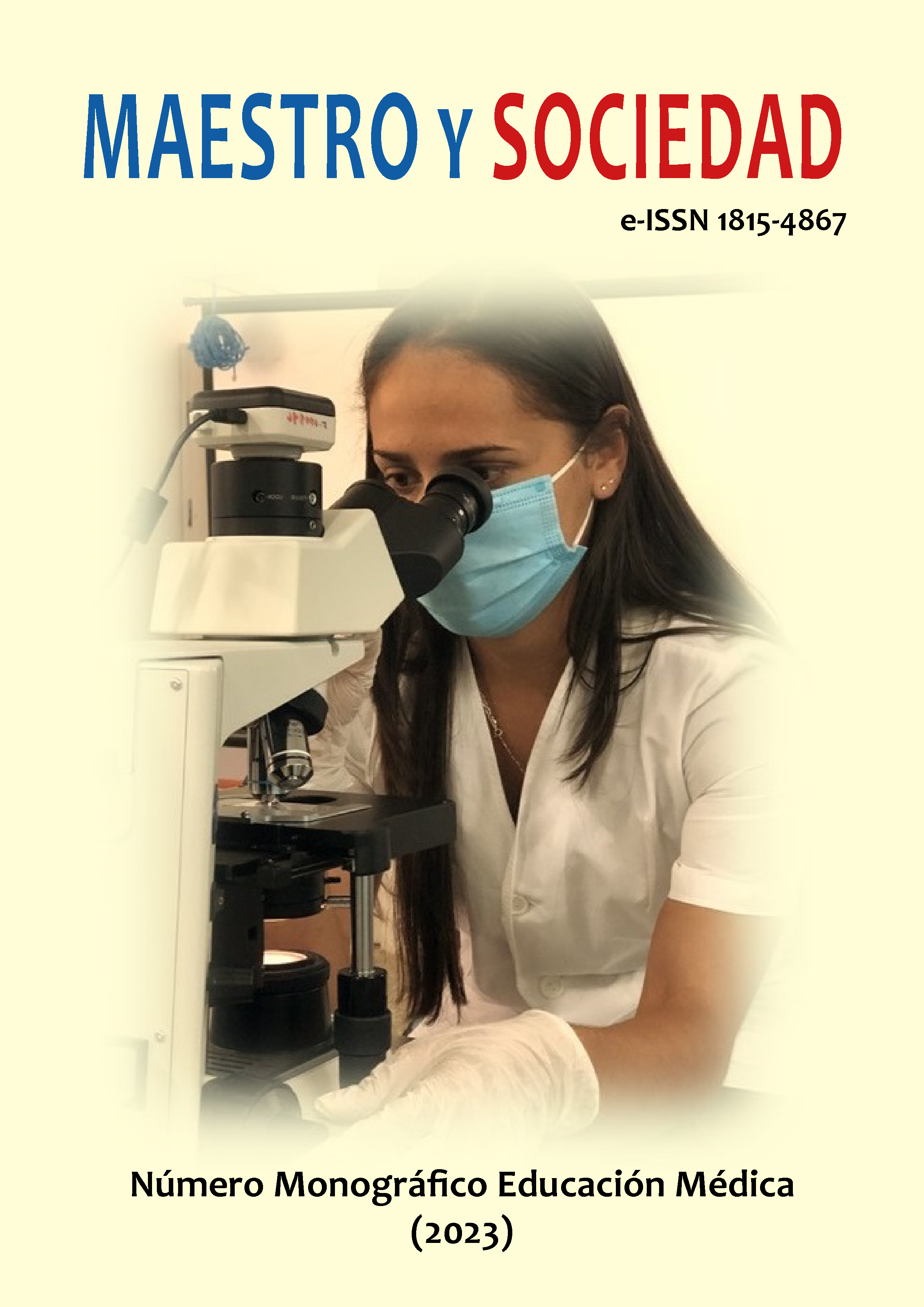Investigative management model of information and communication technologies for the investigative training of Dentistry students
Investigative management model of information and communication technologies for the investigative training of Dentistry students
Keywords:
research training, research management, information and communication technologies, research skills, self-management of knowledgeAbstract
The use of Information and Communication Technologies in the research training process of the Dentist is a necessity for the achievement of essential qualitative changes in the acquisition of knowledge and research skills in students. Diagnoses developed showed insufficiencies in the development of research training, as well as in the conception of research tasks in the study plan that make it impossible to achieve the desired levels of creativity. Difficulties are perceived to interact with ICT, in the generation of knowledge from scientific and technological research, for which the elaboration of a Model of investigative management of information and communication technologies for the investigative training of dental students. The contributions of this research are marked in the design of a model and the research management strategy with the use of Information and Communication Technologies for the research training of Dentistry students. The evaluations offered by specialists in the workshops carried out on the contributions of the research, as well as the exemplification of the strategy in two years of the Dentistry career, and in the active research groups due to the COVID 19 pandemic, corroborated the feasibility and relevance of the same.
References
Álvarez-Cruces, D. J., Otondo-Briceño, M. y Medina-Moreno, A. P. (2019). Evaluación de la incorporación de un foro virtual por redes sociales entre estudiantes de odontología chilenos. Rev. Univ. Ind santander salud, 51(2), 117-128. http://dx.doi.org/10.18273/revsal.v51n2-2019004
Bayés Cáceres, E., León Robaina, R., Cáceres Diéguez, A. y Acosta Ortega, L. (2019). Aspectos sociales de la ciencia y la tecnología en la formación investigativa de los estudiantes de estomatología. Revista Medisan, 23(5).
Bravo López G., Illescas Prieto S. y Lara Díaz L. M. (2016). El desarrollo de las habilidades de investigación en los estudiantes universitarios. Una necesidad para la formación de investigadores. Revistadecooperacion.com, (10).
Del Castillo Saiz G. D., Sanjuán Gómez G. y Gómez Martínez M. (2018). Tecnologías de la información y las comunicaciones: desafío que enfrenta la Universidad de Ciencias Médicas. Edumecentro, 10(1), 168. http://www.revedumecentro.sld.cup 168
Fernández, J. A. (2013). El principio rector de la educación médica cubana. Un reconocimiento a la doctrina pedagógica planteada por fidel ilizástigui dupuy. Educ med super. 27(2), 239-248. http://scielo.sld.cu/scielo.php?script=sci_arttext&pid=s0864-21412013000200011&lng=es&tlng=es
Fuentes González, H. C. (2009). El proceso de la investigación cualitativa. El método de la investigación-acción. Universidad de Oriente.
Fuentes González, H.C., Montoya, Rivera. J. y Fuentes Seisdedos L. (2011). La formación en la educación superior desde los holístico, complejo y dialéctico de la construcción del conocimiento científico. Universidad de Oriente.
Ilizástigui, F. (1993). La educación en el trabajo como principio rector de la educación médica cubana. (s.e.).
Jiménez Yong Y., Santos Prieto D., Véliz Concepción O. (2019). Modelo de evaluación para la educación en el trabajo desde la asignatura Ortodoncia. Rev edumecentro, 11(1), 132-145.
Pérez García, I. (2018). Metodología para la consulta estomatológica como modalidad de educación en el trabajo en Estomatología. Educación Médica Superior, 32(2). http://ems.sld.cu/index.php/ems/article/view/1216/677
Piaget J. (1983). La psicología de la inteligencia.. Editorial crítica. S.L.
Pozo Vinueza, M. A., Bodero Poveda, E. M. y Cruz Pérez, M. A. (2016). La formación investigativa interdisciplinaria de los estudiantes universitarios con el empleo de las tecnologías de la información y la comunicación (TIC) y su dinámica. Revista Academia y Virtualidad, 10(1), 107-122. http://dx.doi.org/10.18359/ravi.2670
Salas, R.S. y Salas, A. (2014). Educación médica contemporánea. Retos, procesos y metodologías. Universidad de Santander.
Suasnabas-Pacheco, L. S., Suasnabas-Pacheco, E., Gonzalo Macías, H. y Zambrano Pico, J. L. (2022). Una mirada de las tecnologías de información y la comunicación en Odontología. Dom. Cien., 5(2), 226-234. https://doi.org/10.23857/fipcaec.v7i1
Torres Fernández, J. P., et al. (2017). Gestión de la información como herramienta para la toma de decisiones en salud: escenarios más probables. Revista cubana de investigaciones biomédicas, 36(3). http://scielo.sld.cu
Vilart Vidal, M. N. (2018). Empleo de los entornos virtuales de enseñanza aprendizaje por los docentes en los cursos por encuentro de la Carrera de Enfermería. Rev. Educ. Med. Super., 32(3).
Viveros Andrade, S. M., & Sánchez, A. (2018). La gestión académica del modelo pedagógico sociocrítico en la institución educativa: rol del docente. Universidad y sociedad, 10(5), 424-433. http://rus.ucf.edu. Cu/index.php/rus
Unesco. (2013). Enfoque estratégico sobre tics en educación en América latina y el Caribe. http://www.unesco.org/new/fileadmin/multimedia/field/santiago/images/ticsesp p.pdf
Williams Serrano S. C. y Garcés Blanca, R. (2018). La formación de habilidades investigativas en la universidad médica. Realidades y perspectivas. Medisur, 16(2).
Downloads
Published
How to Cite
Issue
Section
License
Copyright (c) 2023 Edgar Bayés Cáceres, Rosario León Robaina

This work is licensed under a Creative Commons Attribution-NonCommercial-NoDerivatives 4.0 International License.
This journal provides immediate open access to its content, based on the principle that offering the public free access to research helps a greater global exchange of knowledge. Each author is responsible for the content of each of their articles.



























 Universidad de Oriente
Universidad de Oriente 